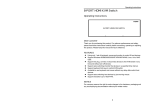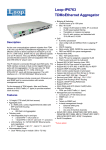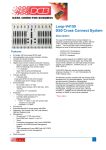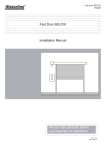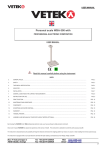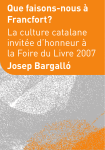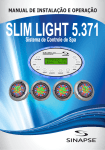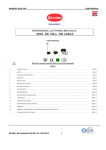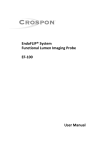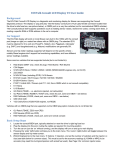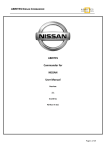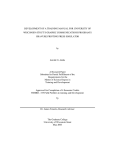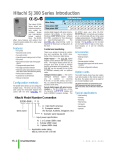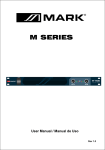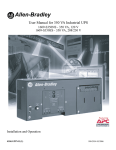Download ROS Intelligent - Clonica networks
Transcript
ROS iluminación intelligent Smart Lighting for Smart Cities Intelligent luminaires for an integral remote management service www.roslighting.com ROS iluminación What is Intelligent What is Intelligent ROS iluminación presents Intelligent, a total remote management service which includes the supply of the luminaires, the MRA remote management electronic module, the implementation and further support. Thus, smart luminaries are provided with a bidirectional capacity: the capacity to receive and send information through a control center. This allows the optimization of Street Lighting logistic, with the continuous monitoring of the energy consumption and the possibility to carry out preventive maintenance. This represents both an economic and energy saving leading to a more sustainable management. Data are transmitted by radiofrequency which allows to act on luminaires point to point or grouped, independently of the feeder pillar. Luminaire i Smart Lighting for Smart Cities With SINAPSE technology Remote management system Setting up & technical suport i i Smart Lighting for Smart Cities Advantatges Total service Intelligent consists of the set of luminaire plus remote management module, providing a total and entire service witch begins when goods are supplied till the end of setting up*. Logistic efficiency. Economic saving in maintenance Preventive and planned maintenance. Elimination of checking control of the installation. Reinforcement of the ecologic and modern image of the municipality Remote managed Street Lighting Centralized control of the street lighting. Adaptation of the lighting levels to the real needs of the municipality. Individual or area ignition, turn off and flux modification. Continuous audit. Constant energy consumption monitoring. Energy efficiency and economic saving Luminaries with variety of optical solutions to adapt the light distribution to each environment, with discharge lamp or LED technology. Individual or area luminous level adjustment. Adaptation of power to the virtual power, that is to say, to the one which is really necessary for the lighting of the road according to service conditions. Constant luminous flux, adapting it to the gradual depreciation of the lamps. Reduction of the CO2 emissions thanks to the energy efficiency of the luminaries optics and to the reduction of luminous flux through remote management. Intelligent is an important step towards the Smart City concept. Wide range of smart luminaries ROS Iluminación has studied and adapted luminaires of its Classic and Modern Line range for the incorporation of remote management, being able in this way to offer the best solution for aesthetics and lighting purpose in each area of the municipality. (*) Only the setting up of the remote management service, not the installation of the luminaries. ROS iluminación ROS iluminación Interaction with the lighting With Intelligent you will have a bidirectional system: action and reception of information on each smart luminaire for a complete management of the installation. Working towards SMART CITY through the possibility of incorporating: a. Movement sensors. b. Humidity sensors. c. Temperature sensors. d. Air quality sensors. e. Light sensors. f. Door opening sensors for the control of feeder pillars against vandalism. g. … Available actions Energy saving through the dimming of the lighting level. a. Luminous flux reduction during time with low traffic density, – saving about 30-40%. b. Power reduction until to the needed one (virtual) – saving of 0-25%. For example, if an installation requires 60w (virtual pow- Registered information er), 70w are installed since 60w are not available in the Monitoring of the service life time of the components. Monitoring of CO2 emissions. Obtaining of consume graphics. Obtaining of saving reports. Obtaining of statistical data about component failures. Generation of warning messages on maintenance. Installation and lamp failures in real time. Detection of power line theft. Detection of illegal connection. market. With this system exact 60w can be obtained. c. To keep luminous flux constant, adjusting the system to the depreciation of the luminaries/lamps – saving about 8-10%. New installations always issue a higher flux than is necessary since in the lighting calculations a 20% of depreciation is taken into account. Intelligent allows adjusting the flux depending on the depreciation of the lamp. Optimization of street lighting. a. Selective switching off of luminaries. b. Increase of flux in the pedestrian crossing with the incorporation of proximity sensors. c. Programmed lighting adaptation according to time, date and zone. d. Preventive maintenance. Stored information Model and brand of installed components. Last replacement date of items being part of the installation. Sending of orders Control center Smart luminaires Reception of data i Smart Lighting for Smart Cities With SINAPSE technology Operation and technical specifications The Intelligent system creates a radio meshed network in which each smart luminaire acts as an information receiver/transmitter from and to the control center. Booster Radio transmission Control center Luminaires = node mesh network Smart luminaire Luminaire ROS iluminación Remote management control Smart luminaire's main technical characteristics Mechanical general features: - Injected aluminium housing. - Stainless steel auxiliary screws. Electrical protection: Class II. Optical block: - Possibility of different optical blocks according to the lighting area. Discharge lamp or LED. - Anodized high purity aluminium. - IP-66 - Performance: around 80%. Fulfilling requirements of Spanish Regulations on Energy Efficiency for Outdoor Lighting Installations. Photometry of luminaire ELYPTIC with MH100W lamp. Technical characteristics of remote management module: Input voltage (1) 220-240V AC Self-consumption 1W Output voltage for external elements control F1 y F2 Control 1-10V Maximum input current Maximum output current (2) 3A 3 A (F1) Maximum load 650W 1.5 A (F1+F2) Maximum load 325W Measure incorporated Voltage and intensity Analog/digital inputs (3) Up to 4 Digital outputs (3) Up to 8 (1) Adaptable. (2) Higher powers are allowed prior request. (3) Maximum number of inputs or outputs prior request. Total versatility. The MRA remote management modules are adaptable; this way one can choose the option that best fits the real needs of the municipality: - Ignition and switch off. - Dimming of the lighting levels. - Measurement of intensity, voltage and power factor. - Incorporation of sensors. ROS iluminación ROS iluminación Functioning and thechnical specifications Control Center Radio meshed network Integrated by: Control PC, software and antenna with again of 1’6 km coverage (up to 5 km optional). Control PC features: CPU Cache BIOS version Ram Extensions Graphic card Long-range boosters AMD D510 @ 1600 MHz L1: 32+32 KB – L2: 0 KB – L3: 4 MB 80015 Kingston 99U5295-014.A00LF 2 GB DDR2-533 4x COM, 8xUSB 2.0 Mobile Intel® 945 Express Chipset Family (128 MB) Graphic memory 128MB Memory card 1 Broadcom Netlink™ Gigabit Ethernet (00-18-7D-09-3C-40) Hard drive CD-ROM Operating system Antena adaptation 433.92 MHz radiofrequency communication*. Receivers/transmitters of more than 200 m coverage. Higher gain antennas to extend the coverage area. Usually a single long-range booster. For complicated orographies several boosters may be taken. 232 GB, IDE UO6112N PEC890V SCSI Microsoft Windows XP Professional Service Pack 3 (32 bits) SMA Dimensions 65x66x90 mm Service life 10 years Software features: Programmed by Visual.net. Two layers: - Windows service. - Desktop application. Similar appearance to a Windows desktop application. Includes maps interface for the geolocation and organization of the smart luminaires. SMTP server. Programming of actions of the network. i Smart Lighting for Smart Cities With SINAPSE technology (*) Any other frecuency on request. Implementation, use and exploitation Implementation No civil works No modifications in feeder pillars. The installation of smart luminaries does not differ from the installation of conventional luminaries. ROS iluminación is in charge of the total setting up of the system: - Installation validation. - Control center installation. - Planimetry and database installation. - Programming actions according to requirements of the customer. - Training of personnel to be software users. - Delivery of a user manual. Use and exploitation Ease of operate for the control center users. High computer skills not required. Common use of the software not needed: - The actions are automatically sent to the luminaires. - The information and data of the operating parameters are received via e-mail (lamp failures, saving and consumption reports,...) Possibility to ordering specific actions Software updates available ROS iluminación www.roslighting.com DESDE 1940 / SINCE 1940 ROS iluminación R. ROS ALGUER, S.A. Street Lighting Solutions R. ROS ALGUER, S.A.: Dr. Almera, 30 · 08205 Sabadell (Barcelona - SPAIN) · Tel. +34 937 263 799 · Fax +34 937 260 200 · [email protected]











